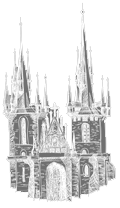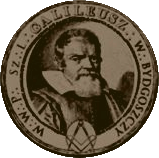Freemasonry
Freemasonry is a wide and internally complicated term. Paradoxically, the answer to "what is the freemasonry" is not simple and straightforward. In many parts of the world and in many historical times one would probably get a different opinion. Conseqently, there is no one definition - but rather a many of them.
Most descriptions have some aspects in common. Therefore, we can say, freemasonry is a voluntary, deeply humanist philosophy and social movement with the objective of improving the well being of humanity - mainly through self-development of its members (Freemasons).
Ars Regia in the past
 The origins of Freemasonry involves the concept of a "free mason" or just... stone craftsman. Masonic movement gave effect to the concept of the old masters, who passed down knowledge of the construction from generation to generation. Their works, the most beautiful and the most perfect medieval Gothic cathedrals were peaks of their art. The ancient builders had to combine the respect and admiration of the three traditions: education (especially geometry and engineering), art (understood as the ability to create beautiful things and fine), and spirituality (this is so that the interiors of the cathedrals are the temples, not only "beautiful spaces" in high-rise buildings). It is also worth noting that the work of the builder in those days was not easy at all. Apprentices had to learn patience and make great effort to learn even the simplest things, such as stone processing.
The origins of Freemasonry involves the concept of a "free mason" or just... stone craftsman. Masonic movement gave effect to the concept of the old masters, who passed down knowledge of the construction from generation to generation. Their works, the most beautiful and the most perfect medieval Gothic cathedrals were peaks of their art. The ancient builders had to combine the respect and admiration of the three traditions: education (especially geometry and engineering), art (understood as the ability to create beautiful things and fine), and spirituality (this is so that the interiors of the cathedrals are the temples, not only "beautiful spaces" in high-rise buildings). It is also worth noting that the work of the builder in those days was not easy at all. Apprentices had to learn patience and make great effort to learn even the simplest things, such as stone processing.
For a fellow apprentice, to repeatedly hit a stone with a chisel, shaping and forming it was a way to learn humility in the face of Nature. In this way, for a mason, working on the stone was at the same time shaping itself.
Freemasonry today
Today, we dont expect our Brethren to be working on stone. Since 17th Century freemasonry moved its focus from physical to a spiritual world. Our precedessors worked on stones - we work on ourselves.
Freemasonry is not a unified movement
In the wide family of movements of Freemasonry, there is a place for both the conservative traditions (referring to the heritage chivalry), and for rationalist ones (derived from the French Enlightenment thought). Even views on matters related to spirituality and religiosity are not a single coherent paradigm. Some factions directly refer to the Judeo-Christian tradition and require their members to absolute faith in God. Others are satisfied with the recognition that the fate of the world is affected by spiritual causative force - while avoiding the explicit assignment of the power of a particular religion. There is also a Masonic current that take position closer to a fully adogmatic attitude and does not require their members to the declaration of faith in the transcendental world.

